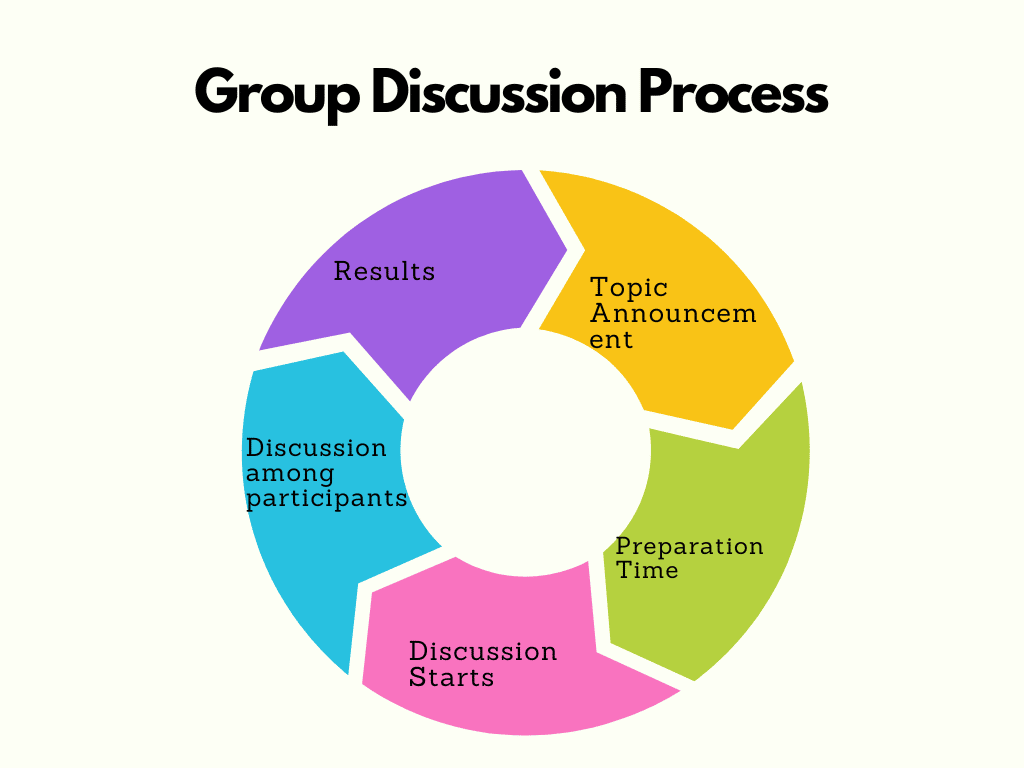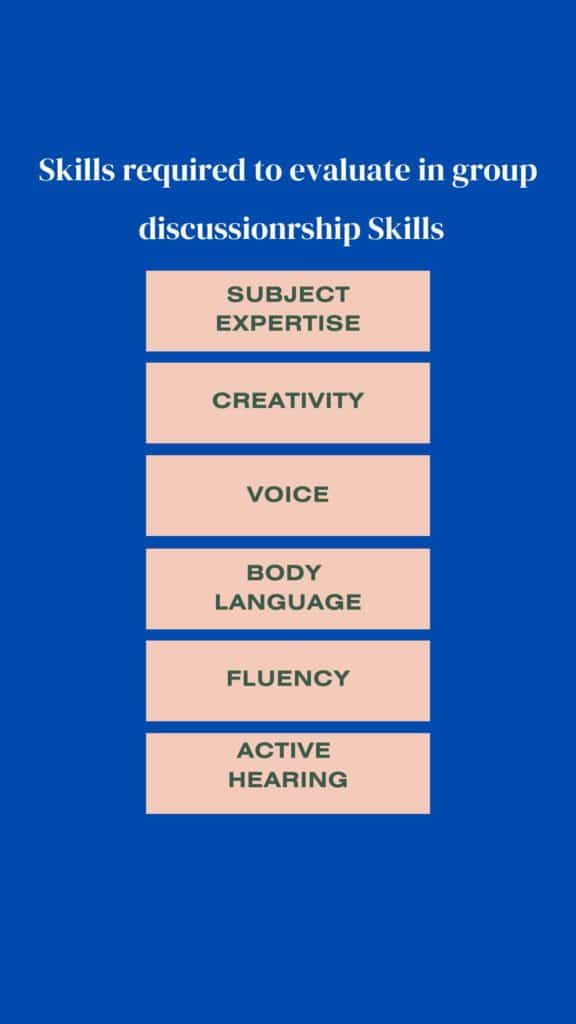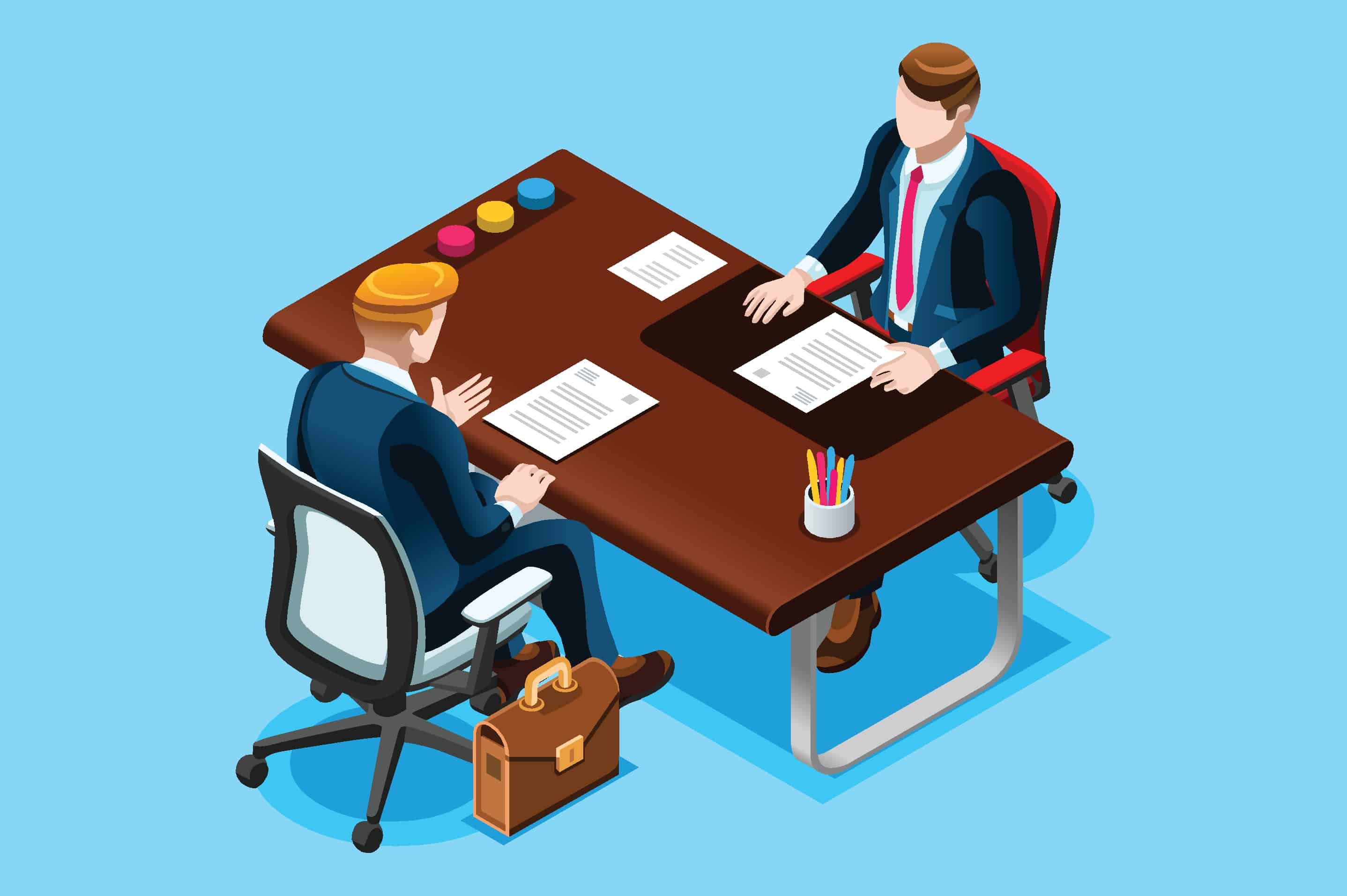- What Do You Mean By Group Discussion?
- What Are The Types Of Group Discussions?
- Importance Of Group Discussions
- How Did The Group Discussion Round Commence?
- Essential Skills Evaluated During a Group Discussion
- Expert Tips On How to Succeed in Group Discussions
- Common Mistakes to Avoid in a GD Round
- 20 Trending Topics For Group Discussions
- Conclusion
- FAQs on Group Discussions
Group discussions are a vital part of the selection process in many organizations.
They serve as a platform to assess candidates’ communication, teamwork, and problem-solving skills.
- But what is the meaning of group discussion?
- How many types are there?
- What is the procedure involved?
This comprehensive guide will explore these questions, providing you with the essential knowledge to excel in your next group discussion round.
Read on to discover the key strategies and tips for success in this critical stage of the interview process.
What Do You Mean By Group Discussion?
A group discussion is a structured form of communication where participants exchange ideas and viewpoints on a specific topic.
It is often used in academic settings, corporate environments, and recruitment processes to evaluate individuals’ skills and perspectives.
Here are the critical elements explaining what is group discussion:
1. Purpose: The main goal is to assess participants’ ability to communicate effectively, think critically, and work collaboratively.
2. Format: Typically involves a group of 6-12 participants discussing a topic within a set time limit.
3. Moderator: A facilitator or moderator usually oversees the discussion to ensure it stays on track and to evaluate the participants.
4. Skills Assessed:
- Communication: Clarity, coherence, and the ability to articulate thoughts.
- Teamwork: Ability to work collaboratively and respect others’ viewpoints.
- Problem-Solving: Ability to analyze the topic and propose solutions or arguments.
- Leadership: Initiative to guide the discussion and encourage participation.
Overall, group discussions are a dynamic and interactive way to measure the participants’ interpersonal and intellectual abilities in a group setting.
What Are The Types Of Group Discussions?
Group discussions can be categorized into several types based on content and objectives. Here are the main types of group discussions:

1. Factual Group Discussions
These discussions revolve around concrete facts and information. The participants need to grasp the topic well and present accurate data and evidence to support their viewpoints.
- Example Topics: “The Impact of Global Warming,” “Advancements in Renewable Energy,” and “Current Economic Trends.”
- Skills Assessed: Research abilities, knowledge of the subject, and the ability to present facts.
2. Opinion-Based Group Discussions
In these discussions, participants express their views and opinions on a given topic. There is no right or wrong answer; the focus is on how well participants can argue their perspectives and engage with differing viewpoints.
- Example Topics: “Is Social Media Beneficial or Harmful?”, “The Role of Technology in Education,” “Ethics in Business.”
- Skills Assessed: Critical thinking, persuasive communication, and the ability to handle opposing opinions.
3. Group Conversations Based on Case Studies
Participants are given a scenario or a case study to discuss and analyze. They must work together to identify problems, evaluate options, and propose solutions.
- Example Topics: “A company’s marketing strategy failing,” “A healthcare policy impacting patient care,” “Resolving a workplace conflict.”
- Skills Assessed: Analytical skills, problem-solving, teamwork, and practical application of knowledge.
4. Abstract Group Discussions
These discussions are based on abstract concepts or philosophical ideas. Participants need to interpret the topic creatively and think outside the box.
- Example Topics: “Red vs. Blue,” “A Journey Without a Destination,” “Time is Money.”
- Skills Assessed: Creativity, abstract thinking, and innovatively linking ideas and concepts.
Understanding the different types of group discussions can help participants prepare effectively, showcasing their strengths in various scenarios and contributing meaningfully to the conversation.
Importance Of Group Discussions
Group discussions (GDs) are vital in job interviews, offering a dynamic setting to evaluate candidates’ interpersonal and professional competencies.
They replicate real-world work environments, enabling employers to assess how individuals perform and interact within a team.
Here’s why GDs are essential:
- Evaluate Communication Skills: Assess clarity, coherence, and effectiveness in conveying ideas.
- Assess Teamwork: Determine the ability to collaborate and work cohesively with others.
- Test Analytical Thinking: Test problem-solving skills and logical reasoning.
- Identify Leadership Qualities: Spot potential leaders who can guide and motivate the group.
- Measure Knowledge: Check awareness and understanding of relevant topics and current affairs.
- Assess Time Management: Observe how well candidates manage and utilize their allotted time.
- Evaluate Persuasiveness: See how effectively candidates can influence and convince others.
- Test Adaptability: Assess flexibility in handling different viewpoints and unexpected changes.
- Measure Stress Management: Evaluate how candidates handle pressure and maintain composure.
- Understand Interpersonal Dynamics: Gain insights into candidates’ personalities and their ability to interact positively with others.
GDs are an integral part of the interview process, comprehensively assessing a candidate’s suitability for a role.
How Did The Group Discussion Round Commence?
The group discussion round is well-structured to evaluate participants’ communication, analytical, and teamwork skills.
Here’s a step-by-step breakdown of how a typical group discussion round is commenced:

1. Topic Announcement
- Initiation: The moderator announces the topic for discussion. This could be a factual, opinion-based, case study, or abstract topic.
- Briefing: Participants receive a brief overview of the topic and any specific guidelines or rules to follow during the discussion.
2. Preparation Time
- Preparation Period: Participants are usually given a few minutes (typically 3-5) to gather their thoughts, make notes, and organize their ideas.
- Strategy Planning: During this time, participants can plan their strategy for the discussion, considering how to introduce points, counter arguments, and conclusions.
3. Discussion Starts
- Commencement: The moderator signals the start of the discussion, and participants begin sharing their views.
- Initial Contributions: Participants can take turns speaking, with some taking the initiative to start the discussion while others may choose to add their points.
4. Discussion Among Participants
- Interaction: The core of the group discussion involves an interactive exchange of ideas among participants. This phase tests the entire group discussion in communication skills, argument, and collaboration skills.
- Key Elements:
Articulation: Clarity and effectiveness in presenting points.
Listening: Paying attention to others’ viewpoints and responding appropriately.
Leadership: Taking charge of the discussion flow without dominating it.
Conflict Management: Handling disagreements constructively.
5. Results
- Evaluation: After the discussion, the moderator or panel of judges evaluates each participant based on their performance.
- Criteria: Common criteria include communication skills, content knowledge, logical reasoning, teamwork, and leadership qualities.
- Feedback: In some cases, participants may receive feedback on their performance, highlighting strengths and areas for improvement.
Understanding this process helps participants prepare adequately, ensuring they can contribute effectively and make a positive impression during the group discussion round.
Essential Skills Evaluated During a Group Discussion

Participants are assessed on various skills crucial for effective communication, collaboration, and problem-solving in a group discussion.
Here are the primary skills on which you are evaluated, along with detailed descriptions:
1. Subject Expertise
- Depth of Knowledge: Demonstrating a comprehensive understanding of the topic. This involves being well-informed and up-to-date with relevant facts, theories, and examples.
- Accuracy and Relevance: Providing accurate and pertinent information to support your arguments. It’s essential to avoid spreading misinformation or going off-topic.
2. Creativity and Originality
- Innovative Thinking: Introducing unique perspectives and fresh ideas others may not have considered. Creativity in approach can differentiate you from other participants.
- Problem-Solving: Applying creative solutions to the issues discussed. This skill showcases your ability to think outside the box and approach problems from various angles.
3. Voice
- Clarity: Ensuring your speech is clear and easily understandable. Articulation and pronunciation play a significant role in how your points are received.
- Tone and Modulation: Use the appropriate tone to convey your message effectively. Voice modulation can help emphasize key points and keep the audience engaged.
4. Bodily Language
- Gestures and Posture: Use positive body language to reinforce your verbal communication. Good posture, appropriate hand gestures, and nodding convey confidence and attentiveness.
- Eye Contact: Maintaining eye contact with fellow participants and the moderator to demonstrate confidence and engagement. Avoiding eye contact can be perceived as disinterest or nervousness.
5. Fluency
- Smooth Delivery: Speaking fluently without unnecessary pauses, fillers, or hesitations helps maintain the flow of the discussion and keeps the audience engaged.
- Language Proficiency: Using appropriate vocabulary and grammar to express your ideas clearly and effectively. Mastery of language enhances your credibility and the impact of your contributions.
6. Initiative
- Proactiveness: Taking the lead when necessary by starting the discussion, introducing new points, or steering the conversation back on track if it diverges.
- Encouraging Participation: Facilitating a balanced discussion by encouraging quieter members to share their views and ensuring that all voices are heard.
7. Active Listening
- Attention: Paying close attention to others’ contributions shows respect and interest. Active listening involves nodding, summarizing points, and asking clarifying questions.
- Responsive Interaction: Responding thoughtfully to others’ ideas, building on their points, and respectfully countering when necessary. This skill demonstrates your ability to engage constructively with different viewpoints.
Mastering these skills can significantly enhance your performance in a group discussion, making you stand out as a well-rounded and effective communicator capable of contributing meaningfully to any team or project.
Expert Tips On How to Succeed in Group Discussions
1. Understand the Topic
- Research Thoroughly: Gather as much information as possible about the topic before the discussion. Knowing the background and key points will give you confidence and make your contributions more valuable.
- Clarify Doubts: If the topic is announced on the spot, don’t hesitate to ask for clarification if you don’t understand it completely.
2. Listen Actively
- Pay Attention: Listen to what others are saying without interrupting. This shows respect and helps you build on their points effectively.
- Acknowledge and Respond: Use nods, smiles, or brief verbal acknowledgments to show that you are engaged and understanding the discussion.
3. Be Clear and Concise
- Make Your Points Briefly: Stick to the point and avoid long-winded explanations. Being clear and concise ensures your ideas are understood and appreciated.
- Use Simple Language: Avoid jargon and complex words that might confuse others. Your goal is to communicate effectively, not to impress with vocabulary.
4. Show Leadership Skills
- Initiate the Discussion: If you feel confident, start the discussion. This can set a positive tone and demonstrate your leadership qualities.
- Facilitate Participation: Encourage quieter members to speak up and ensure that everyone gets a chance to contribute. This shows you value teamwork and collaboration.
5. Stay Calm and Composed
- Manage Stress: Stay calm even if the discussion becomes intense. Keeping your composure under pressure is crucial.
- Be Respectful: Avoid getting defensive or aggressive. Respect others’ opinions and address disagreements politely.
6. Respect Other Members
- Value Opinions: Respect all participants by valuing their opinions, even if you disagree with them. This fosters a positive and collaborative environment.
- Avoid Interruptions: Let others finish their points before you speak. Interrupting can be seen as disrespectful and can disrupt the flow of discussion.
7. Contribute Constructively
- Add Value: Make sure your contributions are relevant and add value to the discussion. Avoid repeating points that have already been made.
- Build on Ideas: Constructively build on others’ ideas, which shows that you are listening and thinking critically about the topic.
8. Use Data and Examples
- Support Arguments: Use data, facts, and examples to support your arguments. This makes your points more credible and persuasive.
- Be Prepared: Having a few statistics or real-world examples in mind can help you substantiate your points effectively.
9. Handle Criticism with Poise
- Stay Open-Minded: Accept feedback and criticism without taking it personally. Use it as an opportunity to learn and improve.
- Respond Politely: If you disagree with criticism, respond calmly and respectfully, providing a reasoned argument to support your viewpoint.
10. Summarize Key Points
- Recap Discussions: Towards the end of the discussion, summarize the key points and conclusions reached by the group. This shows your ability to synthesize information and ensures everyone is on the same page.
- Highlight Contributions: Acknowledge contributions from different members, which helps recognize the collaborative effort.
Following these expert tips can enhance your performance in group discussions, demonstrating strong communication, critical thinking, and teamwork skills.
Common Mistakes to Avoid in a GD Round
Group discussions can be challenging, and making inevitable mistakes can hinder performance. Here are common pitfalls to avoid:
- Dominating the Discussion
Taking over the conversation and not allowing others to speak can be aggressive and inconsiderate. It’s important to balance contributing your ideas with allowing others to share theirs.
- Interrupting Others
Interrupting while someone else speaks shows a lack of respect and poor listening skills. Always wait for your turn and let others complete their thoughts before you respond.
- Speaking Without Preparation
Starting to speak without having a clear understanding of the topic can lead to unclear and irrelevant points. Take a few moments to gather your thoughts before contributing to ensure your points are coherent and relevant.
- Being Passive
Remaining silent or participating minimally can suggest disinterest or a lack of confidence. Make sure to engage actively and share your ideas while maintaining a balance.
- Focusing Solely on Quantity
Talking too much without adding substantial value can be detrimental. Aim to make meaningful contributions rather than speaking just for the sake of it.
- Displaying Negative Body Language
Negative body language, such as crossing arms, avoiding eye contact, or appearing disinterested, can leave a wrong impression. Use positive body language to show you are engaged and respectful.
- Getting Emotional or Aggressive
Allowing emotions to take over can lead to unproductive arguments and conflict. Stay calm, composed, and professional throughout the discussion.
- Ignoring Others’ Opinions
Disregarding or not acknowledging others’ viewpoints can create a negative group dynamic. Show that you value and consider different perspectives, even if you disagree.
- Lack of Structure
Presenting your points disorganized can confuse others and weaken your arguments. Structure your thoughts logically to make them easier to follow and more persuasive.
- Failing to Summarize
Not summarizing critical points at the end can leave the discussion without clear conclusions. Summarize the debate to reinforce the main points and show your ability to synthesize information.
Avoiding these common mistakes can help you perform better in group discussions, demonstrating your communication skills, respect for others, and ability to contribute effectively.
20 Trending Topics For Group Discussions
- Artificial Intelligence and its Impact on Jobs
- The Role of Data Science in Business Decision-Making
- The Role of Social Media in Shaping Public Opinion
- Climate Change and Environmental Responsibility
- Cryptocurrency: The Future of Finance?
- The Impact of Remote Work on Productivity
- Data Privacy and Security in the Digital Age
- E-commerce vs. Brick-and-Mortar Stores
- Gender Equality in the Workplace
- The Future of Electric Vehicles
- Mental Health Awareness and Its Importance
- The Pros and Cons of Universal Basic Income
- Influence of Pop Culture on Youth
- The Role of Education in Bridging the Skills Gap
- Sustainable Development: Need of the Hour
- The Ethics of Genetic Engineering
- Impact of Automation on Various Industries
- The Evolution of Space Exploration
- Artificial Intelligence in Healthcare
- Cyberbullying and Its Effects on Teenagers
These relevant topics offer various perspectives ideal for engaging and insightful group discussions.
Conclusion
Group discussions are an essential part of job interviews. They evaluate candidates’ communication, teamwork, and problem-solving abilities in a group setting.
To help you succeed, Great Learning offers free courses like:
which will help you ace your group discussions.
For more specialized preparation, consider the Post Graduate Program in Data Science and Business Analytics or in AI and Machine Learning.
These programs provide in-depth knowledge and practical skills, equipping you to engage in discussions on trending topics in data science, business analytics, and AI and enhancing your readiness for the job market.
FAQs on Group Discussions
A group discussion in communication is a structured conversation among multiple participants in which they share ideas, opinions, and insights on a specific topic.
The goal is to collaboratively explore the subject, solve problems, or make decisions. A moderator often facilitates a group discussion to ensure productive and inclusive dialogue.
It’s essential to remain composed and assertive when faced with a dominant participant. Politely interject by saying, “I appreciate your point, but I would like to add…” or “Let’s hear what others think about this.”
This helps balance the discussion and ensures everyone gets a chance to speak.
The opening statement is crucial as it sets the tone for the discussion. A strong opening can capture your attention and establish your position.
Make it clear, concise, and relevant to the topic. If you’re not the first to speak, you can still make a significant impact by building on previous points.
Feeling nervous is common. Practice relaxation techniques such as deep breathing before the discussion.
Focus on listening actively and contributing thoughtfully rather than trying to dominate. Preparation and practice can also boost your confidence.
Balance assertiveness and humility by confidently expressing your points while remaining open to others’ ideas. Assertiveness involves standing by your views, whereas humility means recognizing that others may have valuable insights.
Disagreeing with the majority is fine if you present your points respectfully and logically. Support your arguments with evidence and be open to counterarguments. Constructive dissent can add value to the discussion.







